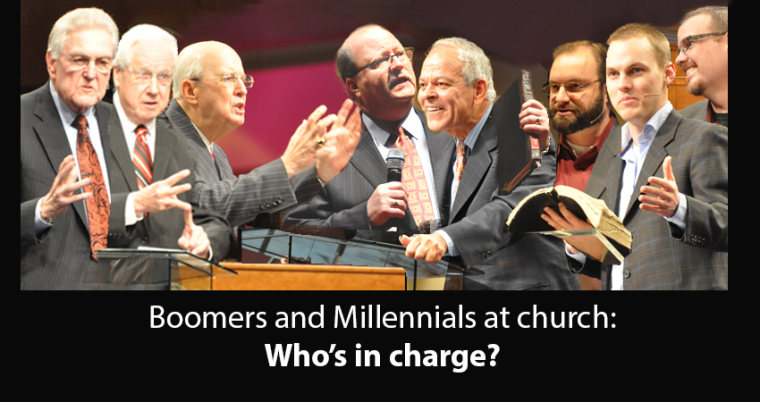Boomers and Millennials at church: Who's in charge?

RICHMOND, Va. (Christian Examiner) – George Turner, 23-year-old seminary freshman, thinks he's ready to step in for the senior pastor at his church.
It's not that Rev. Price is burned out. He's just, well, a little stale. His preaching is too predictable. Worship style? Yawn.
"I just think we need to be more tactile and relational," young Turner observed. "I've experienced deep connections with the mystery of the dance of God burning incense in my dorms."
Rev. Price, out on a hospital visit, was unavailable for comment.
Turner and Price aren't real, by the way. They're fictional characters invented by the Babylon Bee, a satirical website that lampoons church topics. But they hit uncomfortably close to home when it comes to the generational changing of the guard in churches across America. Baby boomer pastors and lay leaders are beginning to hand the reins over to Millennials in thousands of churches. But the hand-off isn't necessarily going smoothly – on either end.
The generational struggle goes deeper than the well-documented "worship wars" over hymnbooks versus praise choruses, traditional versus contemporary worship or shirt-tails and jeans versus coats and ties. The underlying question: Who is going to lead U.S. churches over the next 10 to 20 years?
America's more than 76 million baby boomers, born between 1946 and 1964, are retiring at a rate of 10,000 a day. But plenty of them are in no hurry to step aside, whether in the corporate world or in the church. In fact, millions of boomers enjoy good health and have decades of potential service ahead of them. About 30 million boomers attend U.S. churches.
GENERATIONAL LOGJAM
But a generational logjam looms: Millennials, born between the early 1980s and early 2000s, number more than 80 million. The oldest of them have entered their mid-30s and want their turn at leadership in companies and social institutions. They became the majority of the U.S. workforce in 2015. More than 28 percent of working Millennials now fill management roles in business offices.
Churches, however, tend to change more slowly.
"The baby boomers still want to hold on to much of what is sacred to them, but they are torn by the needs around them," says Virginia Baptist pastor Kevin Moen, 58. "The Millennials are fed up with bureaucracy and structure. They're very project-oriented with a 'see the need and fix it now' mentality. They don't want committees, teams and perpetual offering requests. I think the clash has begun, albeit quietly in most places."
Moen started out as a youth minister pushing boundaries more than 30 years ago. As a veteran pastor, he still likes to challenge the status quo – but with a gentler tone.
"I've learned from experience that in a family there must be give and take, with a tolerance for others' tastes and desires," he says. "My frustration is more with those in leadership who don't want to do what it takes to reach and keep younger folks."
Millennial ministers who share Moen's frustration about churches' reluctance to try something new have another option: start their own churches.
"The most interesting trend I see is the rise and seeming ease of church plants as opposed to 10 years ago," observes Josh Daffern, 38, a Mississippi pastor and Gen Xer who sees himself as a bridge of sorts between Millennials and boomers.
More Millennials, Daffern says, "are avoiding the [generational] clash altogether by starting their own church."
That may work for some young leaders. And creative church starts can reach secularized Americans turned off by traditional churches. But launching a church is a high-risk, high-fail proposition, like starting a company. The most successful church starts have the financial and spiritual support of existing churches and denominations. And that means seeking help and guidance from older, more experienced pastors.
Boomers, in other words.
Clearly, a little cooperation helps on both sides of the generational church divide.
Here are several tips for closing the gap from Dan Darling, a 30-something pastor and Southern Baptist leader:
1. Younger leaders need older leaders as mentors. The relationship can be formal or informal, but it needs to be intentional. "For youngish leaders like me, we should recognize our wisdom deficit. We have much to learn from wise, older leaders who have gone before us," Darling writes.
2. Younger leaders need humility. "We need to dial down the hubris a bit. ... Sometimes I think the church chases relevance and youth so quickly, we make older generations feel useless, as if all their hard work and effort are in vain. Instead, let's respect the previous generation even as we seek to improve or update the ministry model."
3. Older leaders should realize how much they have to give. And they need to give it willingly to younger leaders eager for their help. Training the next generation isn't "giving up." It's faithful discipleship.
4. All generations need to build unity. Unity begins with respect, listening more, and talking less.